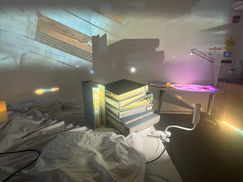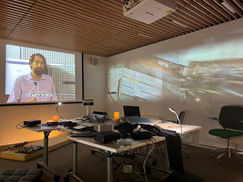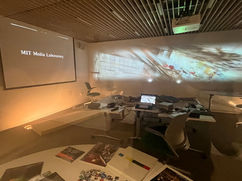PAGE UNDER CONSTRUCTION
#consumer electronics #gaming #human-machine interaction #learning #storytelling #interfaces #machine learning #affective computing #ethics #industry #interactive #computer science #interfaces #learning #entertainment #art #artificial intelligence #design #creativity #history #technology #archives

An online exhibition and augmented reality experience of MIT Media Lab history based on an interactive threeJS model of the Media Lab architecture. The first stage features a multi-floor interactive model as an open archive for alumni, faculty, and students to add content. Content can be transposed into an AR application throughout E14 and E15.
Community events included an installation during the Festival of Learning and an alumni gathering during 2024 graduation to encourage memory recall and foster presence in the past.
![ml-old-new.gif.800x800[5691]](https://static.wixstatic.com/media/1dad0c_cb0e645dc60e4b51b9db6726886e0723~mv2.gif/v1/fill/w_800,h_551,al_c,pstr/1dad0c_cb0e645dc60e4b51b9db6726886e0723~mv2.gif)
![ml-old-new.gif.800x800[5691]](https://static.wixstatic.com/media/1dad0c_cb0e645dc60e4b51b9db6726886e0723~mv2.gif/v1/fill/w_800,h_551,al_c,pstr/1dad0c_cb0e645dc60e4b51b9db6726886e0723~mv2.gif)

Storytelling through Multimedia
I collected public domain 2D animations comprising a geneology of CGI from 1963 to 1987, and used fragments of the animations to create a 3D environment for storytelling.
Ed Catmull’s 3D hand and Fred Parke’s 3D face were re-created in contemporary 3D software, and re-animated in an interactive 3D narrative environment.
Interacting in a 3D Timeline
Users explored a chronology of CGI history by retargeting their hand gestures via a Leap Motion Controller onto Catmulls’ “hand”.
The dialogue of the story was told by two bookended iMac G3 monitors, each animated by Parke’s faces, re-animated with the original Apple text-to-speech engine, “MacinTalk”.

Using media artifacts with contemporary technology, the story of “The Machine Stops” was told through the medium of media archaeology.















